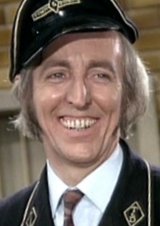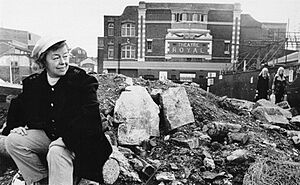Bob Grant (actor) facts for kids
Quick facts for kids
Bob Grant
|
|
|---|---|

Bob Grant as Jack Harper in On the Buses
|
|
| Born |
Robert St Clair Grant
14 April 1932 Hammersmith, London, England
|
| Died | 8 November 2003 (aged 71) Twyning, Gloucestershire, England
|
| Occupation |
|
| Years active | 1952–1998 |
| Spouse(s) |
|
Robert St Clair Grant (born April 14, 1932 – died November 8, 2003) was an English actor, comedian, and writer. He is most famous for playing the bus conductor Jack Harper in the popular TV show On the Buses. He also starred in the movies and stage versions of the show.
Bob Grant's Early Life
Bob Grant was born in Hammersmith, West London, England, on April 14, 1932. His parents were Albert George Grant and Florence Burston. He went to Aldenham School for his education.
Starting His Acting Career

Bob Grant studied acting at the Royal Academy of Dramatic Art. To earn money, he worked as a salesman and even as a bus driver, which is interesting because of his most famous role later on!
After serving in the Royal Artillery (a part of the army), he performed on stage for the first time in 1952. He appeared in a play called Worm's Eye View in Horsham.
His first show in London was in 1956. He spent several years acting at the Theatre Royal Stratford East. He then got a main role in the musical Blitz! in London's West End, where he performed for two years.
In 1964, he was in a musical comedy called Instant Marriage. He helped write the story and songs for this show.
Bob Grant also started appearing in movies. These included Sparrows Can't Sing (1963) and Till Death Us Do Part (1969). In 1967, he returned to the Theatre Royal, Stratford. He starred in a funny play called Mrs Wilson's Diary, which later moved to the West End.
In 1968, he acted in a six-part radio comedy show called The 17-Jewelled Shockproof Swiss-Made Bomb.
Becoming Famous with On the Buses
Bob Grant became very well-known for playing Jack Harper, the bus conductor, in the TV comedy show On the Buses. The show ran for 74 episodes from 1969 to 1973.
He also helped write 11 episodes and one special show with his co-star Stephen Lewis, who played Inspector Blakey.
On the Buses was very popular right away. Its success led to three movies: On the Buses (1971), Mutiny on the Buses (1972), and Holiday on the Buses (1973). This TV series was the most successful part of his career.
Later Years and Challenges
After On the Buses ended, Bob Grant found it hard to get other acting jobs. People mostly saw him as Jack Harper. He traveled to Australia to perform in a comedy play. He also continued to appear in musicals and pantomimes (family shows, often at Christmas).
In 1975, he wrote and starred in a TV pilot show called Milk-O. He played a milkman who had funny adventures. However, this show did not become a full series, and Bob Grant did not act on television again after that.
In 1980, he played the main character in a BBC radio version of Don Quixote. Later, in 1986, he played a detective in a radio comedy thriller. On stage, he also performed in Shakespeare's play The Winter's Tale.
In the 1980s, Bob Grant went through some difficult times. He faced personal challenges because he wasn't getting much work and had money worries. In 1987, he left his home for a few days to clear his head. He later said he felt very low and just needed to get away. After this, he gained some public attention, which helped him get a few more acting jobs.
In 1990, there were plans to bring On the Buses back as a new show called Back on the Buses. The whole original cast, including Bob Grant, even appeared on a TV show called Wogan to talk about it. However, the new show never happened because it couldn't get enough money.
Another long period without work led to more personal struggles in 1995. He and his wife went on holiday to Goa in India to feel better. When they returned, they moved to a small cottage in Twyning, Gloucestershire, hoping for a fresh start. Bob Grant lived a very quiet life there.
His last acting role was in a play called Funny Money in July 1998. Sadly, his new start didn't last, as bills continued to arrive and work remained scarce.
Bob Grant passed away in 2003.
Bob Grant's Film Appearances
| Year | Title | Role | Notes | Ref. |
|---|---|---|---|---|
| 1959 | I'm All Right Jack | Card player | Uncredited role | |
| 1960 | The Criminal | Prisoner | Uncredited role | |
| 1963 | Sparrows Can't Sing | Perce | ||
| 1965 | Help! | Cameo | His scenes were cut from the movie | |
| 1969 | Till Death Us Do Part | Man in Pub | ||
| 1971 | On the Buses | Jack Harper | ||
| 1972 | Mutiny on the Buses | Jack Harper | ||
| 1973 | Holiday on the Buses | Jack Harper |
Bob Grant's TV Appearances
The following is a list of television programmes in which Grant was involved.
| Year | Title | Episode | Station | Role | Notes | Ref. |
|---|---|---|---|---|---|---|
| 1959 | Quatermass and the Pit | The Wild Hunt | BBC One | Ted (Electrical technician — uncredited) | Series 1, Episode 5 | |
| 1959 | Quatermass and the Pit | Hob | BBC One | Ted (Electrical technician — uncredited) | Series 1, Episode 6. | |
| 1961 | Sir Francis Drake | The Doughty Plot | Independent Television | Clements | ||
| 1963 | No Hiding Place | Solomon Dancey's Luck | Independent Television | Alexander Mudgeon | ||
| 1964 | Armchair Theatre | A Jug of Bread | Independent Television | Ben | ||
| 1964 | The Plane Makers | Appointment in Brussels | Independent Television | Antique Dealer | Series 3, Episode 11 | |
| 1965 | Merry-Go-Round | The Incredible Adventures of Professor Branestawm | BBC One | Professor Branestawm | Broadcast as part of the Merry-Go-Round children's education series | |
| 1967 | Softly, Softly | James McNeil, Aged 23 | BBC One | Napier | Series 2, Episode 12 | |
| 1968 | Z-Cars | Punch-Up: Part 1 | BBC One | Ted Griffin | Series 6, Episode 157 | |
| 1968 | Z-Cars | Punch-Up: Part 2 | BBC One | Ted Griffin | Series 6, Episode 158 | |
| 1969 | Mrs. Wilson's Diary | Independent Television | George Brown | |||
| 1969–1973 | On the Buses | Independent Television | Jack Harper | Grant appeared in all 74 episodes and as a writer with Stephen Lewis for a number of episodes from series 5 onwards | ||
| 1969 | All Star Comedy Carnival | Independent Television | Jack Harper | |||
| 1970 | Comedy Playhouse | The Jugg Brothers | BBC One | Robert Jugg | Written by Grant and Stephen Lewis. Comedy pilot for Series 9 of the Comedy Playhouse | |
| 1970 | The Borderers | The Quacksalver | BBC Two | William Peck | Series 2, Episode 7 | |
| 1970 | This Is Your Life | Reg Varney | Independent Television | Himself | Series 10, Episode 25 | |
| 1971 | This Is Your Life | Doris Hare | Independent Television | Himself | Series 12, Episode 7 | |
| 1972 | All Star Comedy Carnival | Independent Television | Jack Harper | The On the Buses segment was written by Grant and Stephen Lewis | ||
| 1975 | It's a Celebrity Knockout | Craven Cottage | BBC One | Himself | ||
| 1975 | Comedy Premiere | Milk-o | Independent Television | Jim Wilkins | Written by Grant and Anthony Marriott | |
| 1987 | Daytime | The price of fame: in and out of the public eye | ITV | Himself | Discussion show with Sarah Kennedy | |
| 1990 | Wogan | Interview | BBC One | Himself | Interview with the former cast of On the Buses about plans to revive the series as "Back on the Buses" |
See also
- Stephen Lewis
- Joan Littlewood
- On the Buses
- Pitlochry Festival Theatre
- Reg Varney
- Theatre Workshop

